Getting Around, Nigeria Travel, Transport and Car Rental
(Nigeria, NG, West Africa)
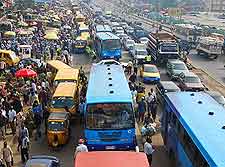
Travelling around Nigeria is relatively straightforward. In general, there's plenty of public transport in the form of buses and coaches. If you're planning to travel around Nigeria by car and aren't familiar with the roads, then it may be best to hire a driver along with the car.
Getting around Nigeria's major cities, such as Abuja, is also relatively straightforward. Whilst there can be lots of traffic to contend with, the transportation system in these places is fairly well organised. Land border crossings are as follows:
- Benin - Lagos to Cotonou highway
- Cameroon - Bama (north) and Mfum, nearby Ikom (south)
- Chad - via Cameroon
- Niger - Ilela, Kano and Katsina
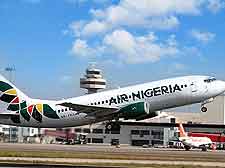
Lagos Murtala Muhammed International Airport (LOS) / Arriving by Air
Address: Murtala Muhammed Airport Road, Ikeja, Lagos Island, Nigeria, NG, Africa
Tel: +234 01 4970 3357
Although Lagos is no longer Nigeria's capital city, it remains its major transport hub. Thus, most visitors to Nigeria will arrive at Lagos Murtala Muhammed International Airport. The airport is located in the suburban district of Ikeja, some 22 km / 14 miles from Lagos city centre, and is served by all the main African airways and many international operators. To get from the airport to your hotel, car rental is a reasonable travel option, while another is to check whether your hotel can organise a pickup service. The journey by road takes anywhere between 30 and 60 minutes, depending on the weight of traffic and the time of day.
Some European airlines fly to Abuja and Kano, as well as Lagos. Nnamdi Asikwe International Airport in Abuja is served by KLM, Luftansa and British Airways, as well as Delta from the US. Located around 35 km / 22 miles from Abuja city centre, visitors can get to and from the airport by taxi. Likewise, arrivals at the airport in Kano, can take a short taxi to the town centre.
Domestic flights operate between most cities in Nigeria and are served by a number of local carriers.
- Akanu Ibiam International Airport (ENU) - Enugu, Enugu
- Akure Airport (AKR) - Akure, Ondo
- Bauchi Airport (BCU) - Bauchi, Bauchi
- Benin Airport (BNI) - Benin, Edo
- Ibadan Airport (IBA) - Ibadan, Oyo
- Ilorin Airport (ILR) - Ilorin, Kwara
- Kaduna Airport (KAD) - Kaduna, Kaduna
- Katsina Airport - Katsina, Katsina
- Maiduguri International Airport (MIU) - Maiduguri, Borno
- Makurdi Airport (MDI) - Makurdi, Benue
- Mallam Aminu Kano International Airport (KAN) - Kano, Kano
- Margaret Ekpo International Airport (CBQ) - Calabar, Cross River
- Minna Airport (MXJ) - Minna, Niger
- Murtala Muhammed International Airport (LOS) - Ikeja, Lagos
- Nnamdi Azikiwe International Airport (ABV) - Abuja, Federal Capital Territory
- Port Harcourt International Airport (PHC) - Port Harcourt, Rivers
- Sadiq Abubakar III International Airport (SKO) - Sokoto, Sokoto
- Sam Mbakwe Airport (QOW) - Owerri, Imo
- Warri Airport (QRW) - Warri, Delta
- Yakubu Gowon Airport (JOS) - Jos, Plateau
- Yola Airport (YOL) - Yola, Adamawa
- Zaria Airport (ZAR) - Zaria, Kaduna
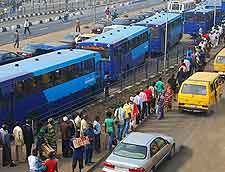
Car Rental
On the whole, Nigeria's roads range from good to patchy. Visitors should drive with extreme care, as Nigeria has a very high road accident rate, or better still, opt to hire a car with a dedicated driver. As a general rule, night-time driving should be avoided.
Cars can be hired at the airport or can be arranged through your hotel, with petrol stations usually being easy to come by. Air conditioning is a must, because of the extreme heat. Road blocks are a frequent occurrence, but shouldn't pose a problem if your documentation is in order and you are patient with the necessary procedures.
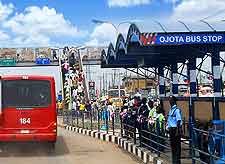
Buses and Coaches
Buses and coaches are useful if you are planning to travel between cities and major towns. Services are operated by the Edo Line, the Edegbe Line and the Izuchkwu Line.
For getting around and hopping between smaller towns, minibus transport has become an essential part of life in Nigeria. Look out for signs on minibuses which show where they are going. There are no set timetables, it's more a case of getting on and waiting for the minibus to fill up. Be sure to allow extra time for heavy traffic delays in major cities such as Abuja, Benin, Ibadan, Kaduna, Kano, Lagos, Maiduguri, Port Harcourt and Zaria, amongst others.
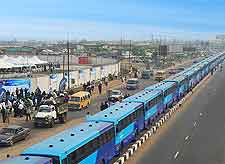
Trains
Passenger rail services are few and far between in this country and are not seen as a safe or reliable option for foreign visitors. The two main rail routes that do operate run from Lagos to Kano and between Port Harcourt and Maiduguri.
Taxis
Bush taxis are more expensive than minibuses, but do have the advantage of getting to your destination a little quicker. Most Nigerian towns come with one or more motorparks (often a little on the chaotic side), serving as the principal transport hub and being filled with a mixture of bush taxis and minibuses. For short journeys, motorcycle taxis known as 'achabas' or 'okadas' are a popular alternative.
Boats and Ferries
Lagos, Port Harcourt and Calabar are all major ports. A limited number of ferry services operate on the southern coastline and may be useful, while some river ferry services are also available along both the River Niger and the River Benue.
 Travelling around Nigeria is relatively straightforward. In general, there's plenty of public transport in the form of buses and coaches. If you're planning to travel around Nigeria by car and aren't familiar with the roads, then it may be best to hire a driver along with the car.
Travelling around Nigeria is relatively straightforward. In general, there's plenty of public transport in the form of buses and coaches. If you're planning to travel around Nigeria by car and aren't familiar with the roads, then it may be best to hire a driver along with the car.



